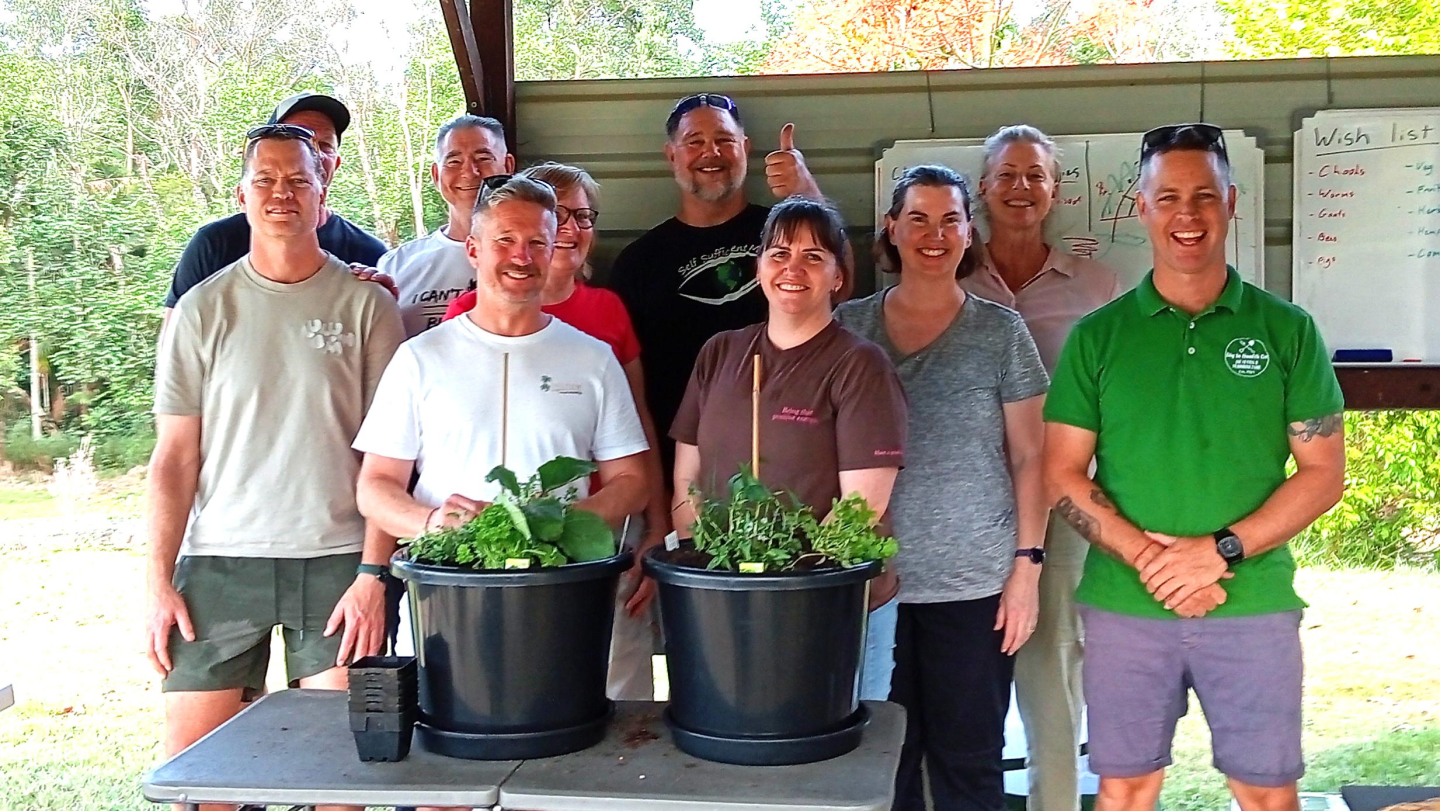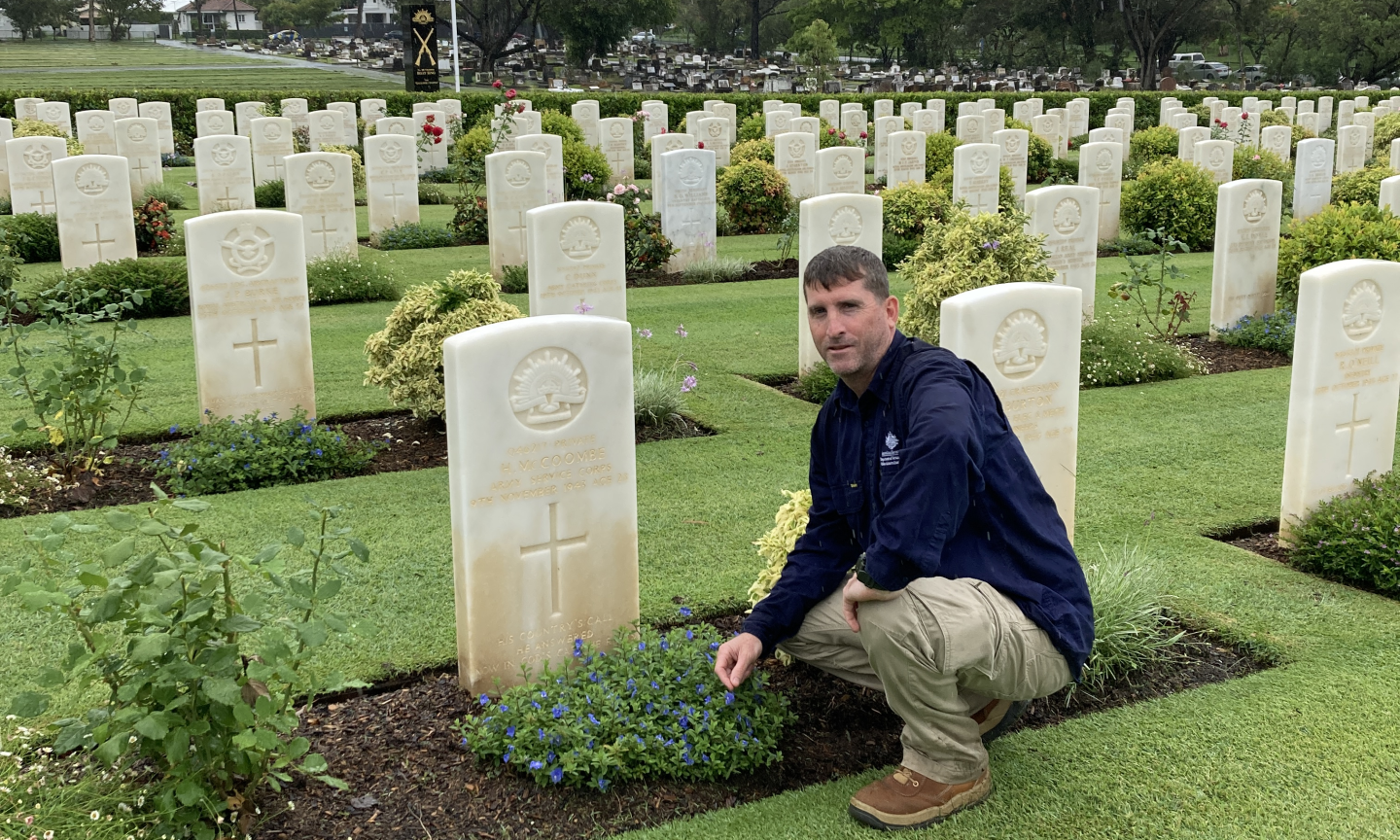Horticulturally happy
Spot of plant-based therapy, anyone? For this kind, you need to get your hands dirty.

Will Gold served as a mechanic in the RAAF for 6 years, working on Hawk aircraft, before shifting gear to become a dietician. While it might seem a radical change, Will had always enjoyed the military’s focus on fitness and a healthy lifestyle, so it seemed like a natural transition.
But as Will began his new career as an Accredited Practising Dietitian, he gradually came to notice that people with poor diets often had poor mental health. While good diet and good mental health might seem like different aspects of our wellbeing, it is remarkable how closely interconnected and interdependent they can be.
‘The other thing that struck me, was that while there were many programs to improve veterans’ mental health or physical rehabilitation, diet was often forgotten,’ says Will. ‘And this is despite its ability to improve both physical and mental wellbeing.’
It was on this premise that Will founded Dig in Health Co in 2021, to help improve veteran wellbeing through making good dietary choices. But Will had bigger aspirations for Dig in Health. He saw the potential not only to improve wellbeing through diet, but through horticulture too.
Of course, it has long been known that horticulture can have a positive impact on wellbeing. Leigh McGaghey, President of Therapeutic Horticulture Australia (THA), notes that ‘in the wake of the First World War many repatriation hospitals introduced some form of community garden or horticultural program to help alleviate the impacts of shell shock for returned veterans.’
From paddock to plate
In the intervening decades, those programs became more about physical rehabilitation, but their therapeutic benefits are being rediscovered. This is what Will wanted to tap into when he developed the Paddock to Plate program.
‘It’s a 4-day workshop to teach people the basics of how to establish and grow a garden, and think about diet in a more holistic way,’ says Will. This goes to everything from thinking about the lay of the land, and the way sunshine and shadows fall, to how rain drains, what seedlings to select, how to build healthy soil and create a productive garden bed.’
Will explains that the program deliberately cuts across numerous wellbeing aspects: ‘It gets people into nature, working with their hands to make something and help it grow. And it gets them thinking in a more meaningful way about where their food comes from.’
The Paddock to Plate program helps improve dietary choices by empowering people to choose for themselves. ‘We were all told to eat our veggies when we were kids,’ says Will. ‘We know fresh produce is what’s best for us, but just telling someone what to do rarely changes behaviour. Once they know how to grow the food, and when they’re given agency, we see their diet improve.’
Beyond improved diet, Will has noticed another benefit: many of the program’s participants have reported a newfound purpose and sense of pride. ‘I believe there is an innate human desire to provide for our families and loved ones, and food is so fundamental to that,’ says Will.
Some veterans have physical injuries from their service that have kept them from the workforce. Building a garden, growing produce and putting food on the plate can give them back the role of provider. ‘There are few things more fulfilling than sitting down to share a meal with your loved ones knowing some of what’s on the plate came from your own labour,’ says Will.
A smorgasbord of benefits

THA President Leigh McGaghey agrees the range of benefits horticulture offers is vast. ‘And one of the great things about learning these skills is they are scalable to whatever your situation is,’ she says. ‘The basic principles of gardening can be applied to everything from a window sill to a botanical garden.’
Horticulture also offers the chance to connect with people in a shared activity. ‘Social engagement and having a shared activity can give people a real sense of purpose and can bring new meaning to their day,’ says Leigh.
Aged care facilities have long used community gardens to foster social connection, but Leigh says any community can enjoy the same benefits: ‘I’ve seen veterans who have worked with their local RSL to establish a garden, providing both a sense of community and a shared project to work on.’
This represents another area where horticulture can improve wellbeing – by building meaning into our day. Many of Will’s participants in the Paddock to Plate program found it through growing produce, but the same is true when it comes to other professions. Leigh says the benefits of therapeutic horticulture can be applied to a range of occupations, including landscaping, plant propagation and grounds-keeping.
That is certainly the case for Brendan McDonald. Brendan served in the Australian Army for 18 years and undertook two tours of Afghanistan before joining DVA’s Office of Australian War Graves where he is now a Trade Services Coordinator.
At rest in nature’s beauty
The team Brendan works with is responsible for maintaining some 70,000 official war graves across 380 cemeteries spread between Rockhampton and Longreach in Queensland and Glenn Innes in northern New South Wales. The work involves everything from maintaining and installing plaques and irrigating the lawns, to selecting plants that will not only look beautiful, but thrive in the conditions where they’re planted.
‘For us, every day is Anzac Day,’ says Brendan. ‘It’s about ensuring the grounds look as good as they can, so when families or friends visit they can see their loved one is cared for.’
For Brendan, the families’ reactions when they see how their loved ones are memorialised makes the effort all worthwhile: ‘These are more than just names in picturesque parks. Mates I served with are commemorated at these sites; this is the place where their memory is preserved and their service honoured, so being part of maintaining that connection has special meaning for me.’
And while Brendan never sought out this career path for its wellbeing benefits, it has nevertheless made a big difference in his life. ‘This is the best job I’ve ever had, and I won’t be leaving until it’s my turn to go up on the wall’ he says, and adds that there aren’t a lot of veterans currently working in the space, but he’d encourage others to consider it: ‘My being here really hits home for others about how important this work is, and the impact it has for the veterans and their families, so it would be great to see more veterans join us.’

Leigh McGaghey finds stories like those of Brendan and Will so encouraging. ‘The benefits of horticulture and gardening are only just starting to find an audience in the veteran community,’ she says.
‘It’s staggering just how many aspects of life horticulture can intersect with and improve. I’ve seen specific therapies designed to help physical rehabilitation and mental health, and I’ve seen communities come together to build a garden and create social connections around a shared activity. And then there are people like Will who are fostering healthy lifestyle and diet around horticulture, and others like Brendan who find a sense of purpose and pride in their work.’
This is the power of horticulture: it can mean different things to different people. Leigh believes horticulture as a restorative treatment is well on its way to finding a larger audience: ‘THA is in talks with DVA to see where we could partner on projects and help improve veteran wellbeing.’
Of course, it is important to remember that anyone can benefit from horticulture s imply by being outside and in the garden because, as Will says, ‘nothing beats being in a green space.’
THA provides a range of resources and educational material on its website about the therapeutic benefits of horticulture and how it can be adapted to fit anyone’s situation. See https://tha.org.au.
If you are interested in the work of Dig In Health Co or joining the Paddock to Plate workshops delivered in partnership with RSL Queensland, visit www.diginhealthco.com.au.
To find out more about the work of DVA’s Office of Australian War Graves, visit www.dva.gov.au/wargraves.
Images:
Participants in a Paddock to Plate workshop; Will Gold is on the far right.
Brendan McDonald at the Lutwyche War Cemetery in Brisbane
President of Therapeutic Horticulture Australia Leigh McGaghey
